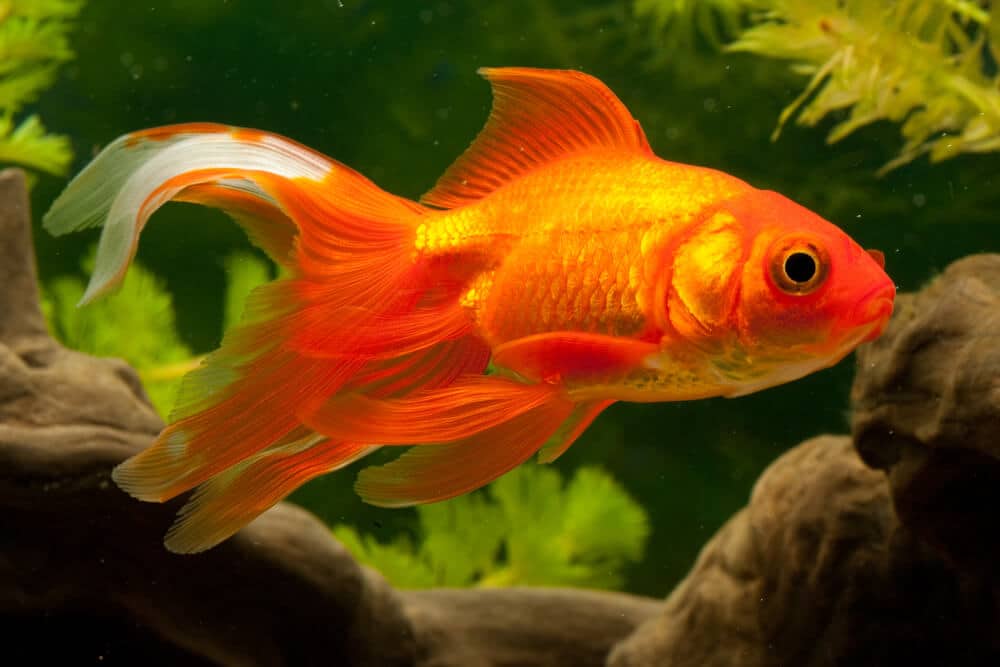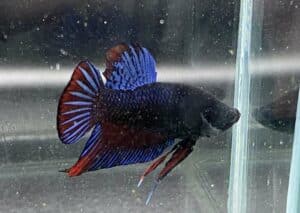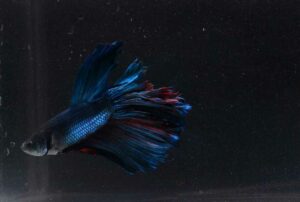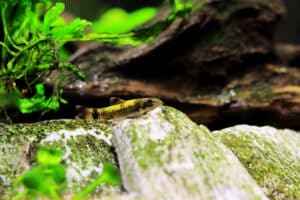If you’re new to raising goldfish and your fish seems to be seeing poorly or not at all in the tank, then it’s understandable to panic a little. If you are wondering ‘is my goldfish blind?’, then the good news is that this might not always be the case.
Some issues, such as high ammonia levels or bacterial infection can indeed cause blindness, although it may only be partial and in some cases, your fish may even adjust once the water is properly treated and its quality is improved.
Let’s talk about signs that your goldfish might be blind, common causes of vision impairment in goldfish, and what you can do to help prevent this occurring in your tanks!
How To Know If My Goldfish Is Blind?
When your goldfish seems to be having problems with their vision, the easiest way to test if it is blind is to take a clean chopstick or a plastic spoon and to immerse it in the water slowly where your fish would normally see it.
If they can see the stick, then the proper response is that the fish will flee, so you can get a quick confirmation. Try this from both sides so that you make sure that there is not a chance of partial blindness, and this will show you very quickly if your fish is having problems seeing.
Other signs that you can look for include the following:
- Cloudy eye coloration
- Saprolengia fungus (which looks like a cotton ball growing near or on the eye)
- Swimming erratically
- Unable to effectively go after food
- Bulging eyes
- Visible cataracts
- Any obvious injuries to the eyes
Your fish will adjust over time, even if their eyes are damaged, but what you can do to help will largely be a matter of determining the actual cause of the blindness for proper treatment.
With that in mind, let’s look at the most common reasons for blindness so that you may choose the best approach to help your fish!
Why Do Goldfish Go Blind?
Goldfish may go blind for a number of reasons, so we’ve collected the most common that you will see in order to give you an idea of the root cause of the issue. Reasons that goldfish sometimes go blind may include the following:
- Ammonia burns
- Cataracts
- Too much light
- Dead-eye syndrome
- Tuberculosis
- Saprolengia fungus
Ammonia burns
A range of 0 to .25 ppm is what you’ll want to target in your tank, with 0 being ideal. Fish waste can quickly turn into ammonia and this in turn, can actually burn your goldfish’s eyes!
Check the ammonia levels and nitrate every few days and this should be easy to avoid.
Cataracts
Goldfish may develop cataracts, much like humans can, and the causes are actually varied. Genetic disposition is one, as well as poor tank conditions, a diet that is not sufficiently nutritious, or even parasitic infections.
There may be a slight possibility to treat cataracts in your goldfish through surgery, but usually, there’s isn’t much that can be done. It would be best to consult with a vet if you find this issue.
One way to know if your goldfish has cataracts is to notice its eyes which turns opaque when affected by cataract.
Too much light
Too much light, especially if it’s never turned off, can have a baneful effect on your goldfish’s vision.
Try to keep very bright lights away from the tank and any tank lighting that you currently use should be switched off at night, in order to promote a natural light cycle and to avoid ocular stress for your fish.
Dead-eye syndrome
Ammonia poisoning, temperature shock, stress, and some medications can cause a condition where your goldfish becomes less reactive to light and motion.
This doesn’t necessarily mean that they are completely blind, but a vet’s assistance will likely be required if cleaning the tank and assessing their diet doesn’t help with their response time.
Tuberculosis
Mycobacterium spp. Can cause partial or full blindness in fish, as well as many other animals. You’ll hear these infections, sometimes referred to as ‘fish tuberculosis’. While it can cause blindness, in more dramatic cases you may even see the eyes falling out!
Unfortunately, once this has set in there is little that you can do, other than quarantining the affected fish and using any treatments that your vet provides for the water. It is not always a death sentence – many fish will still live for years with this affliction – but this kind of bacterial infection is definitely serious and often fatal.
Saprolengia fungus
Saprolengia fungus is recognized by the way that it is shaped. This particular fungus will form at the eyes and looks rather like a cotton ball. Typically your vet will recommend a score of antibiotics for Saprolengia and this should take care of the fungus quickly, but it needs to be caught early.
Is It Possible To Cure Goldfish From Blindness?
Once you have determined that your goldfish is actually fully or partially blind, your vet will be able to advise you if it’s treatable. In cases like ammonia burns, treatment options may be limited and you will need to adjust how you feed your fish to compensate, but in many cases antibiotics or other common treatments can help.
If you are not able to cure the blindness, it is recommended that you switch to foods designed for bottom feeding fish. The biggest problem for your goldfish is that they can no longer compete for food, so you will need to make it easy for them to find.
Your fish will adjust over time, but aside from switching to bottom feeding fish foods, the best that you can do is to keep the tank clean and to hope for the best. Your goldfish may still potentially live for many years, you just need to ensure that it can still eat and that its environment is conducive to good health.
Tips To Prevent Your Goldfish From Going Blind
Prevention is always best, of course, and with Goldfish it is fairly easy. You just want to make sure that you are checking ammonia and nitrate levels every 3 to 4 days and that you are giving them a proper, healthy diet.
Goldfish flakes are a good start, but you can also add brine shrimp (live is best), as well as daphnia and veggie mixes in order to make sure that they are getting a good, broad spectrum of nutrition.
Provided that the water is clean and their diet is a healthy one, goldfish typically live for 10 to 15 years (and some even broach 30!). Ideally, you want the tank PH levels at 6.5 to 7.5 and you’ll need to watch for ammonia – no more than .025 ppm and even lower is best.
Related Read: Do Goldfish Sleep? (How, Signs, & What To Do)
Wrapping Up
So, we’ve discussed how to tell if your goldfish has gone blind and what you can do in such cases. Thankfully, Goldfish are hearty creatures and can sometimes live up to 3 decades if well-cared for, so it’s up to you to make their tank conditions as optimal as possible.
If you do notice that their response time seems compromised or see that they are even swimming directly into objects they normally dodge, be sure to get your fish to the vet right away.
Blindness in fish may sometimes be treated, but as with any kind of sickness, it’s important to deal with it as quickly as possible! With a little luck, your fish will be feeling and seeing better within a few days of treatment and everything will be okay!
Hi! I’m Praveen Ghoshal, the founder of eFishkeeping.com. Inspired by my Dad, I got interested in fishkeeping when I was a kid. Since then, I have been involved with this hobby. Currently, I have 3 fish tanks at our home, and I enjoy this hobby with my full family. Read more about me here.



![Do Neon Tetras Die Easily? [Here’s The Truth!] do-neon-tetras-die-easily](https://efishkeeping.com/wp-content/uploads/2023/03/do-neon-tetras-die-easily-300x200.jpg)



